Located down a sideroad in old Wanhua District (萬華區), Waley Art (水谷藝術) has an established reputation for curating some of the more provocative indie art exhibitions in Taipei. And this month is no exception.
Beyond the innocuous facade of a shophouse, the full three stories of the gallery space (including the basement) have been taken over by photographs, installation videos and abstract images courtesy of two creatives who hail from the opposite ends of the earth, Taiwan’s Hsu Yi-ting (許懿婷) and Germany’s Benjamin Janzen.
“In 2019, I had an art residency in Europe,” Hsu says. “I met Benjamin in the lobby of a graduation show. I was attracted by his work and his kombucha drink. That’s how we met.”
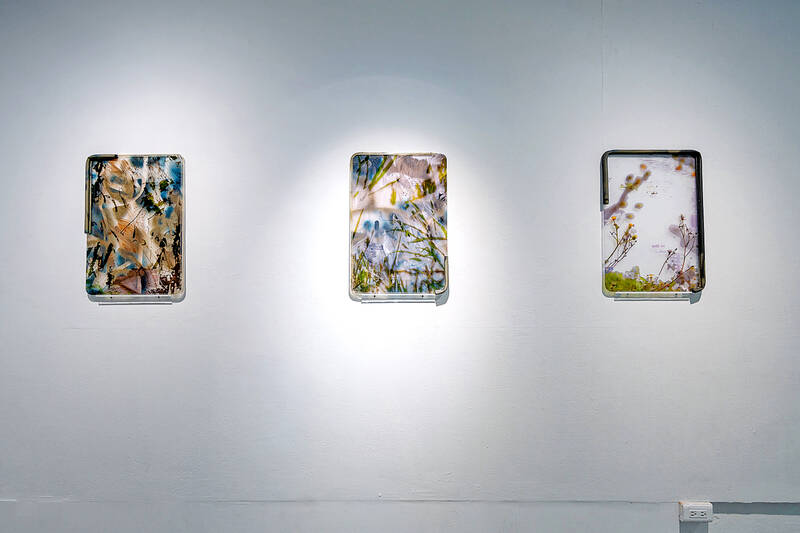
Photo courtesy of Hsu Yi-ting
Hsu, who goes by the English name Eating (a homophone of her Chinese name), grew-up in Taipei. Despite, or perhaps because she hails from Taiwan’s northern conurbation, her intellectual concerns explore the interplay of urban and rural space, the latter of which, she says, is often compromised by politicians catering to the material demands of urbanites.
“Society is always controlled by upper classes,” she tells the Taipei Times. “But farmers are real, they are the people at the base level. You know, it’s the most human thing [to grow food]. Food is the most direct thing you can get from a place where you exist. But there’s no protection for them.”
Beside the River (河邊), then, is an exhibition that explores how social and biological habitats are shaped by economic relationships, and Hsu has made the muddy banks of the Tamsui River (淡水河) her focus.
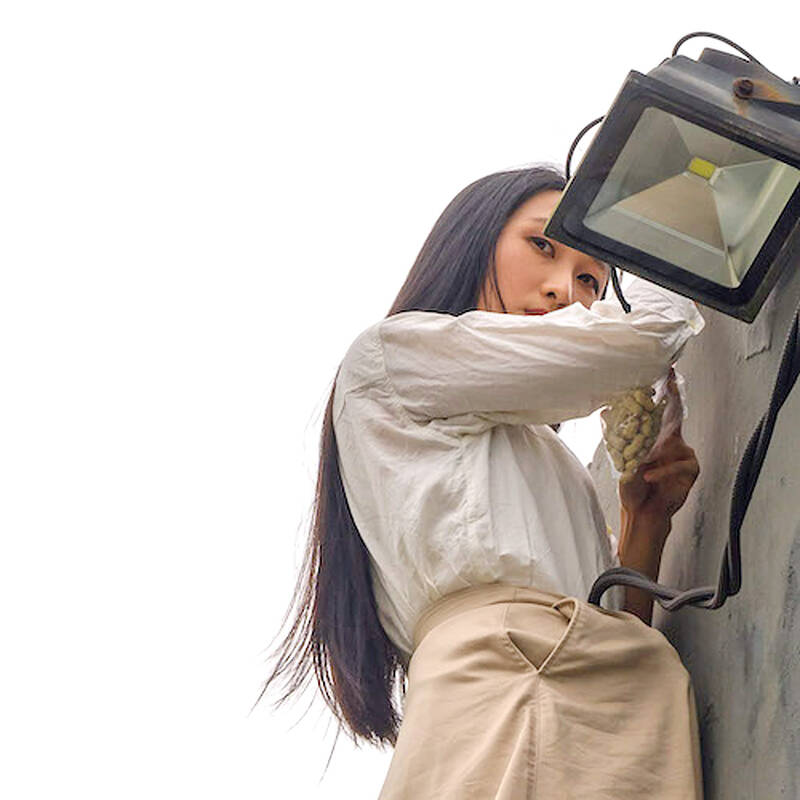
Photo courtesy of Hsu Yi-ting
SUBTERREANAN INSTALLATION
Down a narrow flight of stairs that leads into Waley’s basement, Hsu has placed plants and organic matter to invoke a riverside setting. Amidst the foliage, a short film loops on a screen. Although the imagery is conceptual, the work, titled, Mud and Embankments — The Vegetable Murder Case asks a powerful question: “How does contemporary capitalism affect human-nature relations at water-land junctures?”
For anyone who lives in Taipei, a sprawling city bisected by two major rivers where farms and high-rise apartment blocks still persist cheek-by-jowl, this question is a potent one.
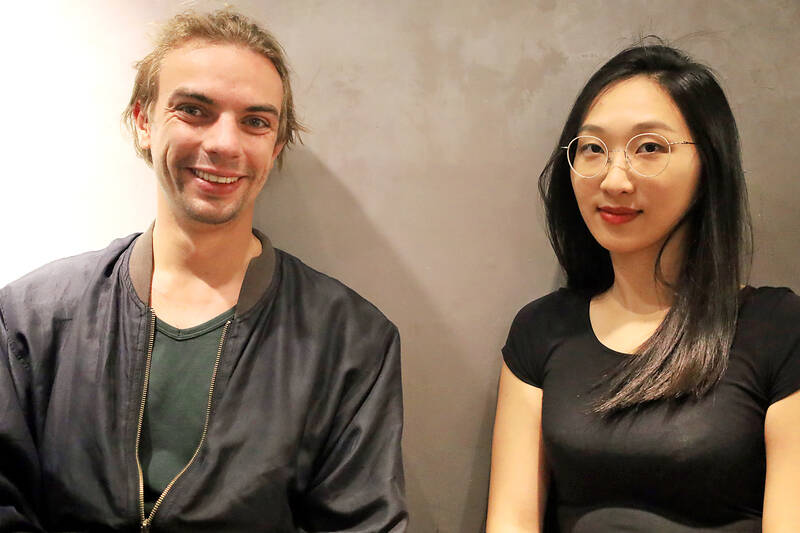
Photo: Thomas Bird, Taipei Times
To the accompaniment of a suspenseful soundscape that mixes the sounds of houses being demolished, the narrative uses vegetables cultivated in the farmland as metaphors for the plight of riverside farmers. According to Hsu, the video “personifies a murder incident of the pastoral scenery.”
The homicide analogy used in her “small theater” essentially reveals how “the government kills the farmer and farming culture in Taipei.”
Her approach to art might be contemporary but history is not absent from the frame. As she sees it, the friction of urban and rural tectonic plates is nothing new in Formosa.
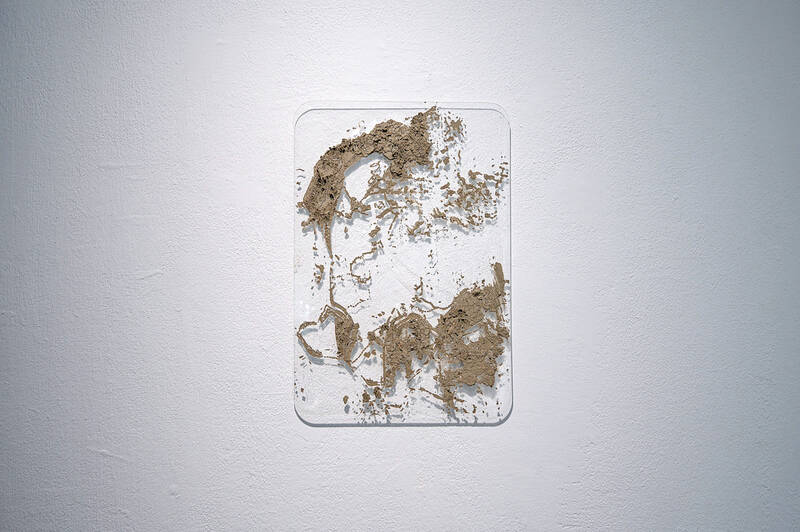
Photo courtesy of Hsu Yi-ting
“In my work, I revisit historical anxieties from Taiwan’s Japanese colonial hunger issues to the early Republic of China’s residential concerns to today’s security fears,” she says, talking about “boundaries” — places like the Tamsui River — “where landscape and power dynamics intersect” in both “visible and invisible” ways.
BOTENAICAL DENTISTRY
Benjamin Janzen’s contribution to the exhibition also explores ecological issues from both international and domestic perspectives. As with Hsu’s work, the legacy of colonialism is significant because, as he puts it, Taiwan’s waves of invasion and settlement have transformed the flora and fauna just as much as it has shaped the populace and its identity.
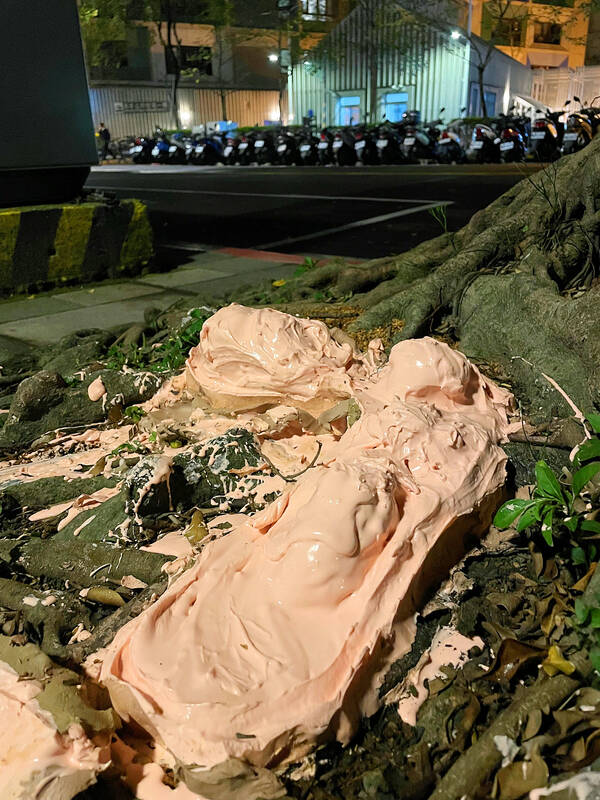
Photo courtesy Benjamin Janzen
“The works created for this exhibition are influenced by a book What World Is This? (2022) by Judith Butler,” the Hamburg-based artist explains. “In the book, Butler talks about the COVID-19 virus as something that connects the individual human body and the communal body –– our inner-selves with the body of society.”
Janzen, who has never visited Taiwan before, began his research by visiting various parks including the Youth Park (青年公園) and Taipei Botanical Gardens (台北植物園).
“What I discovered is much of what we see [in Taiwan] was brought here by foreigners. Like the mango tree which was imported by the Dutch from India. The Chinese fig tree, which is everywhere, is not native. Even the palm trees were brought here by the Japanese.”
The trees are not the only invasive species in the parks that Janzen observed.
“Many of the trees have been damaged by parasites, which also came from elsewhere.”
Using alginate, the substance a dentist would use to make a mold of a patient’s teeth, Janzen has made molds of the scars left in tree trunks by parasitic plants and fungi. These molds he has then put on display on the walls of Waley Art.
“I’m asking, who is the parasite and who is the host?” he says.
Janzen, who has a background in theater, also documented himself getting the mold from the trees, which is also on show in the gallery.
“The notion of performativity, the process, is very important to me,” he says.
The artworks he’s created are not just open to view but to touch as well. The artist hopes the feel of the work will help a visitor meditate on the legacy of travel and migration, invasion and belonging — themes that are particularly prevalent in Taiwan’s contemporary discourse, as they are internationally, due to such issues as climate migration, wars in Ukraine and the Middle East, as well as the pandemic’s lingering impact.
“A lot of my work also decays and is not stable, especially it is not sellable,” Janzen says, alluding to another theme permeating the Beside the River exhibition, that of impermanence.
“I’m interested in the microcosm. I like to zoom in and zoom out. You need to look at things from a distance, but you can also need to get close to things, to look at all the details,” he says.

Exceptions to the rule are sometimes revealing. For a brief few years, there was an emerging ideological split between the Democratic Progressive Party (DPP) and Chinese Nationalist Party (KMT) that appeared to be pushing the DPP in a direction that would be considered more liberal, and the KMT more conservative. In the previous column, “The KMT-DPP’s bureaucrat-led developmental state” (Dec. 11, page 12), we examined how Taiwan’s democratic system developed, and how both the two main parties largely accepted a similar consensus on how Taiwan should be run domestically and did not split along the left-right lines more familiar in

As I finally slid into the warm embrace of the hot, clifftop pool, it was a serene moment of reflection. The sound of the river reflected off the cave walls, the white of our camping lights reflected off the dark, shimmering surface of the water, and I reflected on how fortunate I was to be here. After all, the beautiful walk through narrow canyons that had brought us here had been inaccessible for five years — and will be again soon. The day had started at the Huisun Forest Area (惠蓀林場), at the end of Nantou County Route 80, north and east

Specialty sandwiches loaded with the contents of an entire charcuterie board, overflowing with sauces, creams and all manner of creative add-ons, is perhaps one of the biggest global food trends of this year. From London to New York, lines form down the block for mortadella, burrata, pistachio and more stuffed between slices of fresh sourdough, rye or focaccia. To try the trend in Taipei, Munchies Mafia is for sure the spot — could this be the best sandwich in town? Carlos from Spain and Sergio from Mexico opened this spot just seven months ago. The two met working in the

This month the government ordered a one-year block of Xiaohongshu (小紅書) or Rednote, a Chinese social media platform with more than 3 million users in Taiwan. The government pointed to widespread fraud activity on the platform, along with cybersecurity failures. Officials said that they had reached out to the company and asked it to change. However, they received no response. The pro-China parties, the Chinese Nationalist Party (KMT) and Taiwan People’s Party (TPP), immediately swung into action, denouncing the ban as an attack on free speech. This “free speech” claim was then echoed by the People’s Republic of China (PRC),